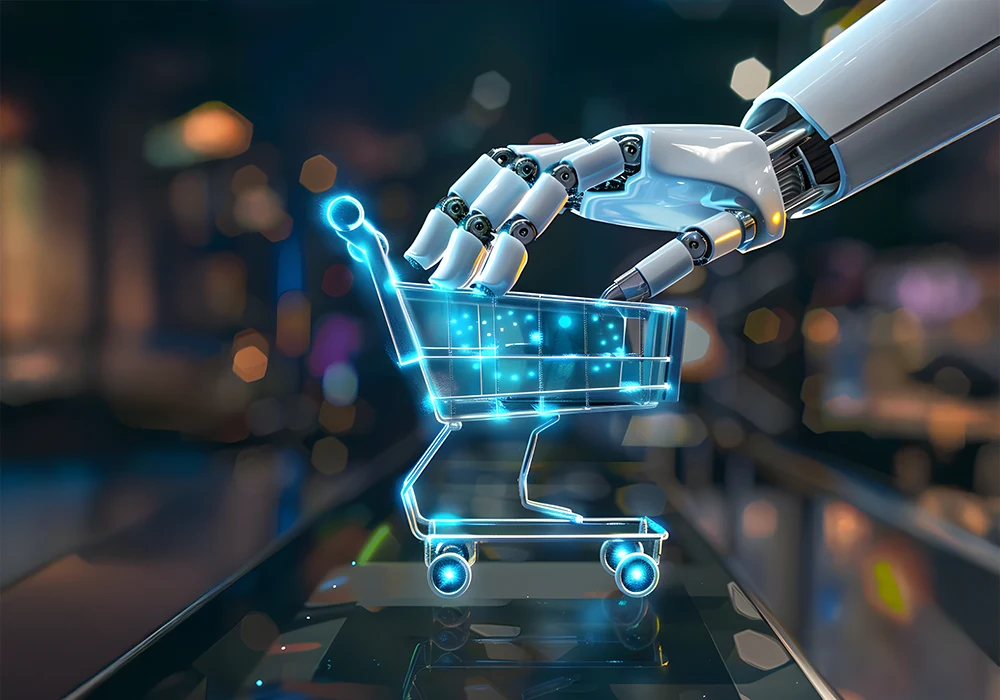Whether it’s a chatbot that provides instant assistance, a recommendation engine
that suggests exactly what you are likely to buy, or security systems that detect
fraudulent activity in real-time, Artificial Intelligence improves the whole digital
shopping process, from browsing to checkout. As eCommerce continues to expand
globally, the integration of AI is no longer optional-it has become essential for
companies that wish to remain competitive and meet ever-evolving consumer
expectations in the digital marketplace.
AI and the Growth of E-Commerce
Artificial Intelligence involves computer systems designed to think and act like
humans by learning, analyzing information, and making decisions.
In everyday life, AI powers voice assistants like Siri, recommendation engines on
Netflix, and navigation apps like Google Maps.
When applied to eCommerce, AI becomes a gamechanger — it processes huge amounts of
customer data, understands preferences,
and predicts future needs, helping businesses deliver smarter, faster, and safer
shopping experiences.
E-commerce was already growing steadily, but the COVID-19 pandemic accelerated it
like never before.
Global e-commerce sales are projected to reach approximately $6.86 trillion
in 2025, with forecasts exceeding $8 trillion by 2027.
With millions of shoppers moving online, businesses needed AI-powered eCommerce
solutions to meet customer expectations at scale.
AI became the answer — allowing companies to personalize shopping, manage inventory,
and secure payments efficiently.
Personalization through AI
Custom Recommendations and Product Suggestions
- Gone are the days when every shopper saw the same homepage. AI delivers
highly
personalized product recommendations.
- Salesforce reports that AI-based recommendations account for nearly
35%
of Amazon’s total revenue.
- By analyzing browsing history, purchase patterns, and time spent on
products, AI
suggests items uniquely suited to each customer.
Dynamic Pricing Strategies
- Traditional e-commerce had static prices; AI enables dynamic
pricing.
- Algorithms adjust prices based on demand, competition, and seasonality.
- Amazon reportedly changes prices every 10 minutes to stay competitive —
benefiting both businesses and customers.
Personalized Marketing Campaigns
- AI tailors marketing campaigns to individual users, replacing generic emails
and
ads.
- Brands like Sephora and Myntra use
AI-powered
recommendations to boost engagement and sales.
Improving Customer Experience
AI-Powered Chatbots and Virtual Assistants
- Modern chatbots provide 24/7 instant support, reducing wait times.
- Example: Sephora offers beauty guidance;
H&M
recommends outfit combinations.
- According to Juniper Research, businesses could save nearly $8
billion
annually by reducing human workload.
Predictive Analytics for Customer Behavior
- AI anticipates needs by studying browsing patterns and purchase history.
- Example: Pet supply platforms suggest restocking before products run out —
enhancing loyalty and convenience.
AR Shopping and Virtual Trials
- AI-integrated Augmented Reality (AR) allows virtual product testing.
- IKEA’s app lets users place furniture virtually in their
rooms.
- Lenskart and Warby Parker offer digital
eyewear try-ons — reducing returns and boosting confidence.
Optimizing Inventory Management
Demand Forecasting with AI
- AI-based predictive analytics helps forecast demand accurately.
- Zara uses AI for distribution decisions;
Walmart monitors supply chains to predict demand spikes.
Automating Supply Chain Processes
- AI automates warehousing and logistics using intelligent robots.
- Amazon employs AI-powered robots to sort, pack, and move goods
— ensuring faster deliveries.
Reducing Waste and Increasing Efficiency
- Smarter forecasting reduces overstocking and waste.
- Promotes sustainability and operational efficiency — aligning with modern
consumer values.
Fraud Detection and Security
AI Algorithms in Fraud Prevention
- AI detects fraudulent activity in real-time, reducing risks.
- PayPal uses machine learning to identify suspicious
transactions instantly.
Improving Transaction Security
- According to Experian’s Global Fraud Report, 62% of businesses
use AI to secure transactions.
- These systems safeguard customer trust — a critical factor in eCommerce success.
The Future of AI in E-Commerce
Developing Trends and Innovations
- Hyper-personalization: Every shopper sees a unique homepage.
- Voice and Visual Search: Products discovered via speech or
image recognition.
- Emotion AI: Systems that detect and respond to human emotions.
- Drone Deliveries: AI-driven route optimization and eco-friendly
logistics.
Possible Difficulties and Moral Responsibilities
- Data Privacy: Customers worry about misuse of personal data.
- Bias in AI: Algorithms might unintentionally favor certain
groups.
- Over-Personalization: Too much automation can feel invasive.
Conclusion
In conclusion, Artificial Intelligence in eCommerce is transforming the way
businesses operate and customers shop.
It personalizes user experiences, accelerates transactions, and enhances security.
AI optimizes inventory, streamlines supply chains, and predicts customer needs
effectively.
As technology advances, businesses that adopt AI will thrive, meeting customer
expectations and maintaining a competitive edge.
Take your business online with Webomindapps.
- Custom web development, SEO, and eCommerce solutions.
- 12+ years of experience, 2000+ successful projects, clients in 25+ countries.










